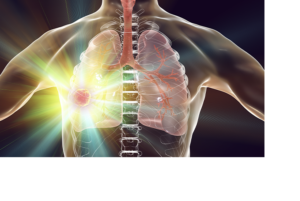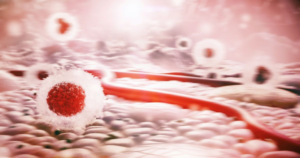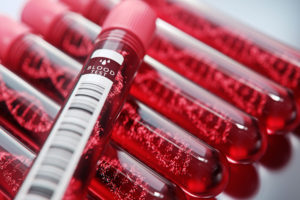Adenocarcinoma Lung Samples
Bay Biosciences provides high quality, clinical grade, lung squamous cell carcinoma (SCC) fresh frozen tumor tissue samples, FFPE tumor tissue blocks, normal adjacent tissue bio-specimens, and matched cryogenically preserved sera (serum), plasma, peripheral blood mononuclear cells (PBMC) and bronchoalveolar lavage fluid (BAL) biofluid samples from patients diagnosed with squamous cell carcinoma (SCC), non-small cell lung carcinoma (NSCLC).
The sera (serum), plasma and PBMC biofluid specimens are processed from non-small cell lung carcinoma (NSCLC), subtype squamous cell carcinoma (SCC) patient’s peripheral whole-blood using customized collection and processing protocols. The squamous cell carcinoma (SCC), non-small cell lung carcinoma (NSCLC) biopsy tumor tissue, normal adjacent tissue and matched biofluid samples are collected from unique patients diagnosed with stage III and IV non-small cell lung carcinoma (NSCLC), subtype squamous cell carcinoma (SCC) and are provided to a valued pharmaceutical customer for research, diagnostics, discovery and drug development.
Detailed clinical data, lung squamous cell carcinoma (SCC) patient’s history, symptoms, complete blood count (CBC), serology, MRI, biopsy tumor tissue, histopathology information, elevated biomarker levels, genetic and metabolic information associated with SCC specimens is provided to a valued customer for research, development and drug discovery.
The squamous cell carcinoma (SCC) sera (serum), plasma and peripheral blood mononuclear cells (PBMC) biofluids are processed from patients peripheral whole-blood using customized collection and processing protocols.

Adenocarcinoma Overview
Adenocarcinoma is a type of cancer that forms in the glands in the body that secrete mucus. Adenocarcinoma can develop in many different organs or parts of the body, including the colon, breasts, prostate, pancreas, esophagus, or lungs. Adenocarcinoma is a common type of some of these cancers. For example, majority of all prostate cancers (99%) and most the pancreatic cancers (85%) are adenocarcinomas. Adenocarcinoma develops when the cells in the glands that line the organs begin to grow out of control. These cells can harm healthy tissues in your body and begin to spread to other parts of your body.
Adenocarcinoma of the Lung Overview
Adenocarcinoma is the most common form of lung cancer. About 40 percent of all lung cancers are adenocarcinomas. Adenocarcinomas are associated with smoking and tobacco use, but theses cancers are also the most common form in patients who have never smoked cigarettes before, especially in women who have never smoked in their life.
Adenocarcinoma is a type of non-small cell lung cancer (NSCLC). It usually begins in the outer edges of the lungs and the lining of the bronchi which are the airway passages into the lungs. It is different from other types of lung carcinomas, which are usually more centrally located in the lungs. Adenocarcinoma grows more slowly than other types of lung cancer and forms smaller masses, but it can also metastasize in its early stages.
Signs and Symptoms of Adenocarcinoma of the Lung
Following are the common signs and symptoms of adenocarcinoma of the lung:
- Problems with breathing
- Persistent cough that does not go away and gets worse
- Coughing up blood
- Chest pain, which gets worse by deep breathing, coughing or laughing
- Feeling tired or weak
- Fatigue
- Loss of appetite
- Hoarseness in voice when talking
- Recurring lung infections, like bronchitis or pneumonia
- Wheezing without history of asthma
- Unexplained weight loss

Adenocarcinoma of the Lung Diagnosis
Patients who have the symptoms of lung cancer, will be asked to get several imaging and lab tests done. Following are some of the tests used for the diagnosis of adenocarcinoma of the lung:
- A chest x-ray, which could show masses in the lungs that may be caused by cancer
- CT scans, which can show lung cancer and cancer that may have metastasized (spread) to other parts of the body
- Testing the sputum (coughed-up mucus)
- Examining the lungs with a lighted tube (bronchoscopy)
- Biopsy, which involves taking a piece of tissue and testing it for cancerous cells
Once the adenocarcinoma is detected from the above test results, the next step will be to try to find out how advanced the cancer is and whether it has metastasized or spread beyond the lungs. This is called the stage of cancer. The stages of lung cancer range from 0 to IV, with the lower stages indicating cancer that is limited to the lung, and stage IV indicating the cancer has spread to other locations and organs in the body. The treatment for adenocarcinoma may also depend on the stage of the cancer.
Following tests are performed to determine the stage of the cancer include:
- Imaging tests such as CT scans, x-rays, MRI, PET
- Bone scans to see if cancer has affected your bones

Bay Biosciences is a global leader in providing researchers with high quality, clinical grade, fully characterized human tissue samples, bio-specimens and human bio-fluid collections from cancer (tumor) tissue, cancer serum, cancer plasma cancer PBMC and human tissue samples from most other therapeutic areas and diseases.
Bay Biosciences maintains and manages it’s own bio-repository, human tissue bank (biobank) consisting of thousands of diseased samples (specimens) and from normal healthy donors available in all formats and types. Our biobank procures and stores fully consented, deidentified and institutional review boards (IRB) approved human tissue samples and matched controls.
All our human human tissue collections, human specimens and human bio-fluids are provided with detailed samples associated patient’s clinical data. This critical patient’s clinical data includes information relating to their past and current disease, treatment history, lifestyle choices, biomarkers and genetic information. Patient’s data is extremely valuable for researchers and is used to help identify new effective treatments (drug discovery & development) in oncology, other therapeutic areas and diseases. This clinical information is critical to demonstrate their impact, monitor the safety of medicines, testing & diagnostics, and generate new knowledge about the causes of disease and illness.
Bay Biosciences banks wide variety of human tissue samples and biological samples including cryogenically preserved -80°C, fresh, fresh frozen tissue samples, tumor tissue samples, FFPE’s, tissue slides, with matching human bio-fluids, whole blood and blood derived products such as serum, plasma and PBMC’s.
Bay Biosciences is a global leader in collecting and providing human tissue samples according to the researchers specified requirements and customized, tailor made collection protocols. Please contact us anytime to discuss your special research projects and customized human tissue sample requirements.
Bay Biosciences provides human tissue samples (human specimens) from diseased and normal healthy donors; including peripheral whole-blood, amniotic fluid, bronchoalveolar lavage fluid (BAL), sputum, pleural effusion, cerebrospinal fluid (CSF), serum (sera), plasma, peripheral blood mononuclear cells (PBMC’s), saliva, Buffy coat, urine, stool samples, aqueous humor, vitreous humor, kidney stones, renal calculi, nephrolithiasis, urolithiasis and other bodily fluids from most diseases including cancer. We can also procure most human bio-specimens and can do special collections and requests of human samples that are difficult to find. All our human tissue samples are procured through IRB approved clinical protocols and procedures.
In addition to the standard processing protocols Bay Biosciences can also provide human plasma, serum, PBMC bio-fluid samples using custom processing protocols, you can buy donor specific sample collections in higher volumes and specified sample aliquoting from us. Bay Biosciences also provides human samples from normal healthy donors, volunteers, for controls and clinical research, contact us Now.
日本のお客様は、ベイバイオサイエンスジャパンBay Biosciences Japanまたはhttp://baybiosciences-jp.com/contact/までご連絡ください。


